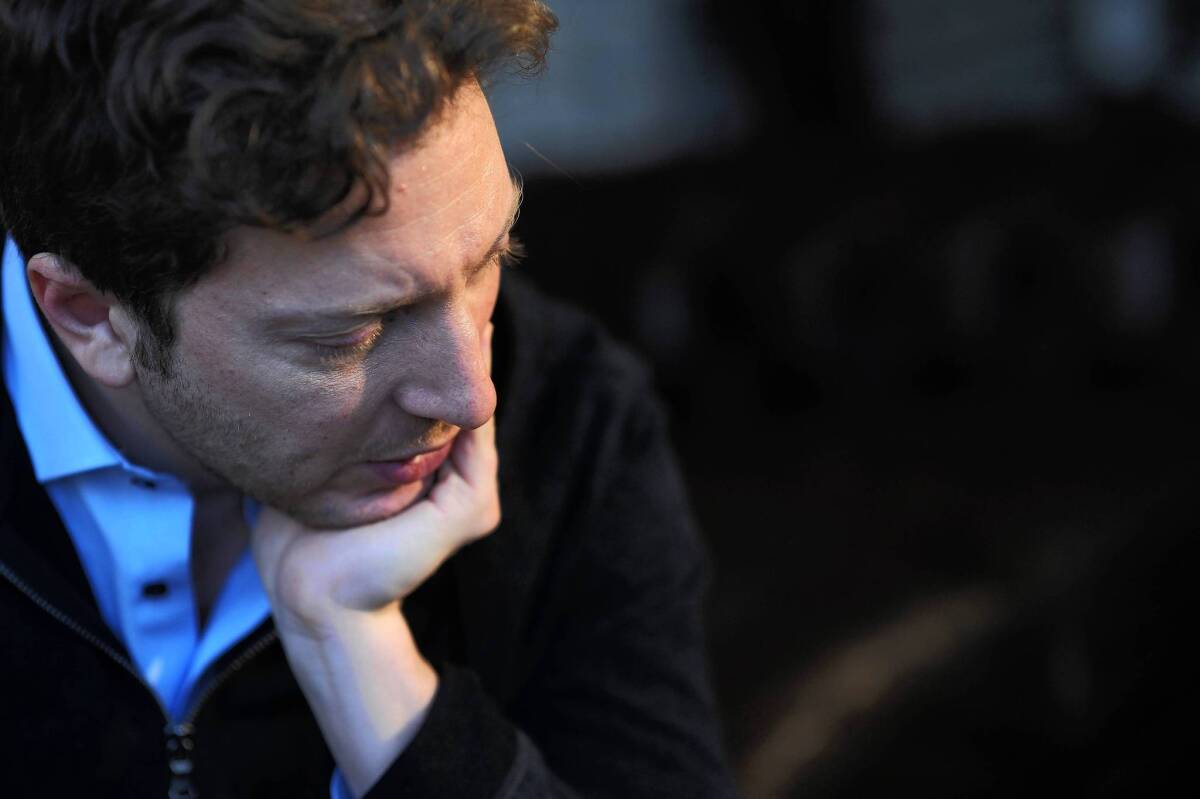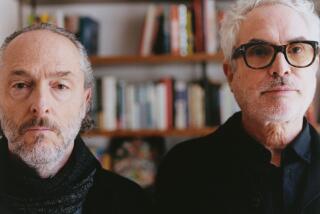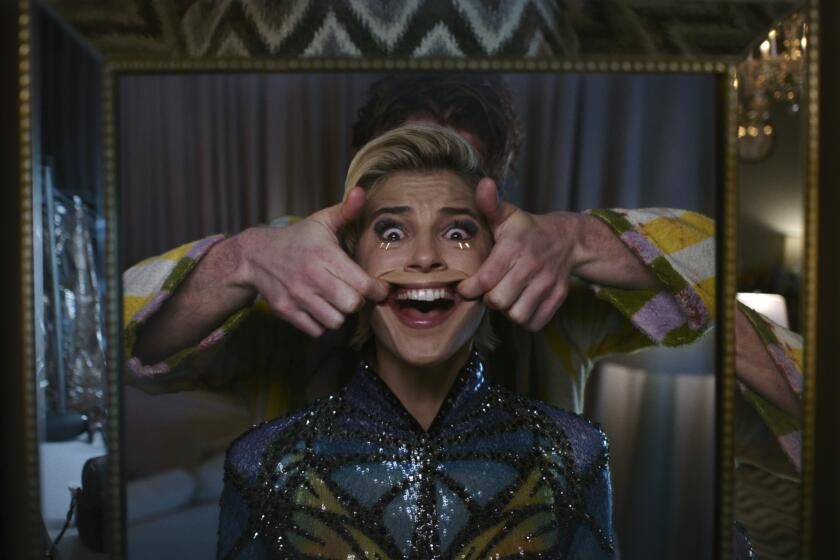âDisconnectâ is a âgrand experimentâ for Henry-Alex Rubin

Movie directors can come across as all sorts of personalities â arrogant, collegial, mercurial, dictatorial. Filmmaker Henry-Alex Rubin arrived on the set of âDisconnectâ, his first narrative feature, striking an unusual pose: clueless.
âI have no idea how to direct a movie,â said Rubin, 39, a prize-winning commercial director who made (with Dana Adam Shapiro) the Oscar-nominated 2005 documentary âMurderball,â which chronicled the grueling sport of wheelchair rugby. âI know how to make commercials and direct documentaries. I am just bringing the only way I know how to do things to fiction.â
Constructed around three interwoven stories, âDisconnectâ â opening Friday â tries to dramatize how technology is fracturing human relationships. Paula Patton and Alexander Skarsgard play a troubled couple who are victimized by an identity thief. The lonely son (Jonah Bobo) of a Blackberry-addicted dad (Jason Bateman) is cyberbullied with tragic consequences. And an ambitious television reporter (Andrea Riseborough) tries to advance her career by exploiting a runaway boy (Max Thieriot) who performs sex chats.
LD Entertainment President David Dinerstein, whose company is producing âDisconnect,â said Rubin was able to attract a solid cast because âof his body of work â his documentary moved a lot of people. And equally important was that Andrew Sternâs script really spoke to people.â
On the heels of âMurderball,â Rubin was sent a pile of scripts. Because he has a fruitful commercial career (heâs done spots for Reebok, Samsung, Budweiser and Gatorade and has won 14 Cannes Lions awards for his advertisements) and because he was working on a couple of other documentaries, he was reluctant to jump into a project he didnât love. Narrative filmmaking, he thought, was a lot more complicated than what he was used to: taking out a camera and shooting something.
Rubin was penciled in to direct an Ethan Hawke movie called âBridgewaterâ in 2008, but the project perished when financier David Bergsteinâs movie empire imploded.
âIn many ways, I dodged a bullet,â Rubin said, glad that he wasnât further along with the film when Bergsteinâs troubles began (those woes, for example, have stuck David O. Russellâs âNailedâ in limbo for five years and counting).
Yet Rubin kept hearing the feature film siren call. âIt is a documentarianâs dream to break into the mainstream,â he said.
Rubin spent two years working on another sports-related documentary, this one about an able-bodied rugby team from West Point, but when the squad failed to qualify for the 2011 Collegiate Rugby Championship, the film went down in flames.
âFor every documentary you see, there are 20 carcasses along the road,â Rubin said. âThat one really broke my heart.â
Around the same time, producer Bill Horberg, a fan of âMurderball,â saw Rubinâs commercial reel, and thought his shooting style would be well-matched to the plot of âDisconnect.â (Rubinâs commercials typically are filmed like mini-documentaries, with lots of hand-held cameras.)
âThese were three stories that felt really relevant to me,â said Rubin, who began making films as an eighth grader by interviewing (and thus disarming) a schoolyard bully. âAnd I wanted to shoot each of their stories as real and as researched as possible.â
After a few meetings, Horberg and producer Mickey Liddell, whose LD Entertainment financed the nearly $10-million production and is distributing the film, gave Rubin the job.
Obviously there are differences between documentaries and commercials, magnified in a feature film. Documentaries are largely unscripted, and the star of a commercial is a car, a sports drink, a tennis shoe. Movies have 120-page screenplays, and the focus of the camera isnât a product but a living, breathing actor â who may have strong feelings about the character theyâre playing.
Liddell and Horberg gave him wide latitude, yet Rubin wasnât sure how to know if he had made the right casting choices.
âI read in Elia Kazanâs book that you should always walk around the block with them,â Rubin said of the how-to primer âKazan on Directing.â So he did just that.
Skarsgard, who plays Pattonâs husband in âDisconnect,â said though he was a fan of âMurderballâ he was initially skeptical of Rubinâs graduation. âThere are a lot of fantastic documentarians who canât direct actors,â he said. But a four-hour meeting with the director calmed his fears, and Skarsgard said he was a joy to be around on set. âHeâs a phenomenal director,â the actor said, who was struck by how Rubin hid his equipment. âHe made us feel very free. It was almost like doing a play in a way â you never knew his cameras were there.â
THE CULTURE OF VIOLENCE: Violence in film
Once on set in his hometown of New York, Rubin tried to mimic his nonfiction techniques. âI really would say I didnât direct the movie. I allowed the actors to be themselves,â he said.
He shot in long takes, shot the story in chronological order, didnât follow the script too slavishly, and tried to place his cameras so the actors wouldnât play to a specific place.
âI knew I wanted a lot of the actors to improvise the dialogue in a way that felt natural â that they put things in their own language,â Rubin said. âI hid my cameras so far away from them that half the time the actors didnât realize Iâd already got the reverse shot.â
In a way, itâs the same in a documentary interview: You want the subjects to relax and open up. âTo me, itâs all about forgetting about the camera,â Rubin said.
âIf the camera gets bumped, the camera gets bumped. If a line of dialogue gets stepped on by another actor, the line gets stepped on. I am just bringing the only way I know how to do things to fiction.â
The documentary-to-drama path has been successfully traversed by several directors, including Paul Greengrass, JosĂŠ Padilha, Michael Apted, Kevin Macdonald and Werner Herzog, among others.
Rubin has made dozens of commercials since filming âDisconnect,â and isnât sure heâs ready to give up advertising. Shooting âDisconnectâ âmakes me really enjoy making commercials. They are such a delight â these little adventures you get to go on,â Rubin said a few hours before heading off to Alaska to work on a new spot. âAnd the more I make commercials, the more the clients are starting to listen to me.â
As naive as Rubin might have been when he started making âDisconnect,â he isnât certain heâs all that wiser for the experience.
âIt was a grand experiment. I really have no idea how it turned out,â he said of the film, which has attracted mixed to positive reviews. âI donât pretend to know what we made.â
PHOTOS AND MORE
Roger Ebert: Career in pictures
ENVELOPE: The latest awards buzz
PHOTOS: Greatest box office flops
More to Read
Only good movies
Get the Indie Focus newsletter, Mark Olsen's weekly guide to the world of cinema.
You may occasionally receive promotional content from the Los Angeles Times.











